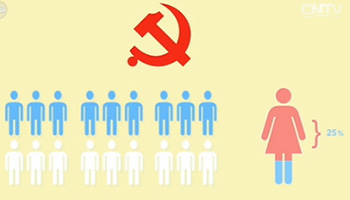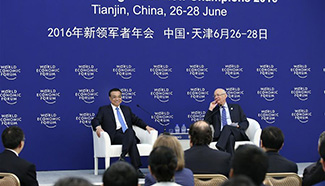by Liu Lili, Chen Peihua and Zhou Jing
MEXICO CITY, June 28 (Xinhua) -- Despite change in the political landscape of Latin America in recent years, the region's relations with China has remained solid, political observers have said.
Argentina has a new leadership; Peru will soon have a a new president from a new political party; Brazil and Venezuela are undergoing political strife.
Observers believe that the solid foundation of mutual trust, strong complementarity between their economies and shared confidence in the future will lead to stability in China-Latin America relations.
AN ENDURING RELATIONSHIP
Political contact and economic cooperation between China and Latin America have increased notably from the start of the 21st century.
China is now Latin America's second-largest trade partner and an important source of investment. In 2015 bilateral trade reached 236.5 billion U.S. dollars and China's nonfinancial direct investment in Latin America surpassed 21.4 billion dollars, according to Chinese figures.
China and Latin America are strongly complementary to each other in economy and trade. While Latin American countries depend heavily on the export of agricultural products and raw materials to China, the Asian country offers abundant investment and advanced experience in infrastructure construction, said Sun Yanfeng, assistant director of the Department of Latin American Studies at China's Institute of Contemporary International Relations.
In recent years, trade between the two sides has suffered from the global recession and drop in the prices of raw materials, giving rise to trade frictions. The political uncertainty in some Latin American countries have also cast cloud on the future of ties between the two sides.
However, considering the solid foundation of equality, mutual respect and pragmatism of this link, regardless of ideological differences, there will be no substantial changes in cooperation in the future. Both sides need each other for social stability and economic sustainability.
China "doesn't want to intervene in politics or tell leaders how to govern. That's a stark contrast from the U.S., which has a long history of intervening in Latin American politics," Patrick Gillespie, a correspondent for CNN Money, has written.
MATURING TIES
Ties between China and Latin America will in fact mature in the medium and long term, Guo Cunhai, a researcher at the Latin American Institute of the Chinese Academy of Social Sciences said, adding that after decades of rapid development, the relationship will settle into a phase marked by stability and moderation.
The liberalization, commercialization and opening up of regional economies will become the new trend in Latin America. The new governments will focus on diversifying, adjusting economic structures and reducing overreliance on raw materials, he noted.
A mature relationship between the two sides will entail new challenges and opportunities for China, Guo said.
Reaching a new consensus and acting in accordance with international law and market regulations will not only be necessary, but will be the reality of China-Latin America ties in the future, something essential to maintaining the sustainable development of the relationship between the two sides, said Guo.
China is adapting to the change in Latin American economies. Cooperation in productiion capacity will continue to develop as Latin America's industrialization progress and will spur the export of China's stronger production capacity for the benefit of both, he said.
Cooperation in infrastructure building will be a new and important area for the future of bilateral ties, he said.
COMPLEMENTARY ADVANTAGES
As global economic recovery remains slow, China and Latin America need to expand their cooperation strategy, intensify their economic complementarity and seek a new engine for future growth, said Yin Hengmin, the special representative on Latin American affairs of the Chinese government.
"China has always insisted on linking its own development to that of other developing countries, and Latin America, in turn, has made an effort to spur the modernization of its economic structure," said Yin.
"The two sides should -- with cooperation in production capacity as a turning point -- improve the quality of pragmatic cooperation and make the most of the complementarity of their respective advantages," he said.
In response to Western media's complaint that the development of China-Latin America ties threatens U.S. interests in the region, Guo said China does not intend to compete with the United States, but to fulfil the common interests of China and Latin America.
"Today, politics in Latin America is increasingly more fragmented and balanced. It is unlikely that in the future we will again see a situation where a single party controls both the government and the parliament at the same time."
"That will make it impossible for one party or one political alliance to have a monopoly on power," he said.
In the same vein, "neither will it be possible to see the emergence of an extreme policy such as 'get close to China, move away from the U.S.' or 'move away from China, get close to the U.S,'" he said.










